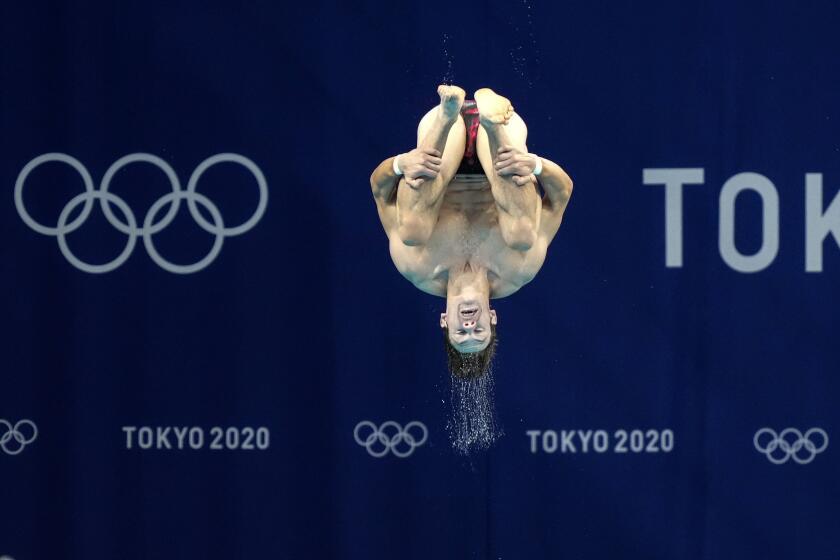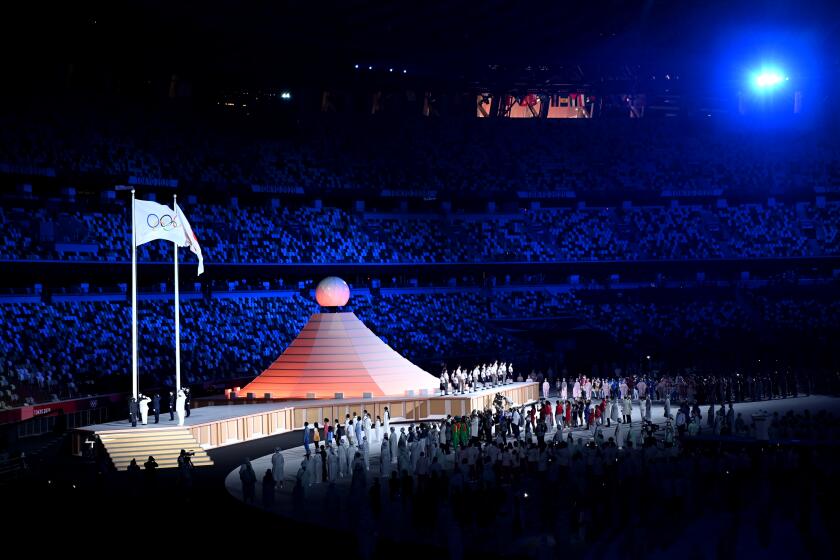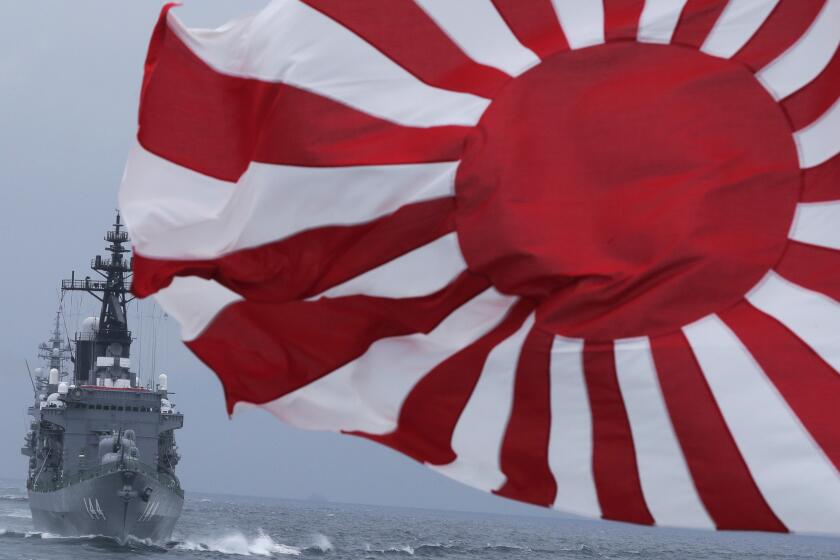Opening ceremonies overshadowed by protests as Olympic backlash swells in Tokyo
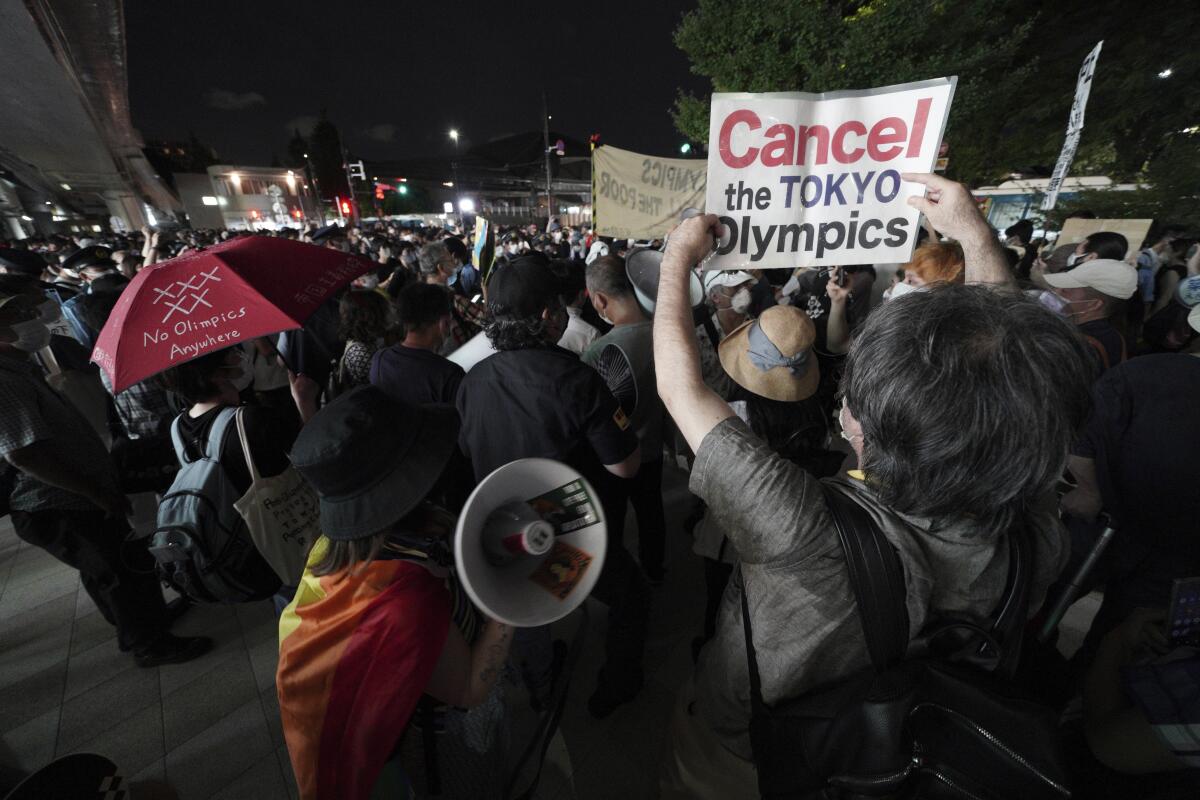
- Share via
TOKYO — Public demonstrations aren’t part of Japanese culture, in part because people here are skeptical of their ability to influence policy.
If anything, protesters are viewed as weirdos, making standing on street corners with bullhorns and banners an activity to be avoided.
So, as ironic as it was, not much should be read into how the anti-Olympic chants that originated from outside the Olympic Stadium on Friday night could be clearly heard inside when the opening ceremony of the Tokyo Games dedicated a moment of silence to pandemic victims.
Which isn’t to say the people here aren’t enraged by how their national government has opened its borders to tens of thousands of foreigners while their prefecture is under a state of emergency.
They are.
The actual signs of widespread disenchantment are more subtle, such as how the Japanese media organizations reported on the news on Team USA’s vaccination rates.
While their U.S. counterparts’ headlines on the stories were focused on the 83% of American athletes who are fully vaccinated, Japanese outlets’ were about the 100 individuals who weren’t.
And it’s been like this for months, with a Japanese press corps that traditionally supports the country’s major institutions adapting to the widespread negativity toward these Games by providing unusually critical coverage.
Ordinarily, the people of Japan love sporting events that play to their patriotism, particularly the Olympics. In the weeks leading up to the typical Games, the media feeds this appetite with an all-you-can eat buffet of fawning stories. If not for the pandemic, more resources would have been dedicated to building up the likes of swimmer Rikako Ikee and soccer star Takefusa Kubo.
A Tokyo Games mired in controversy could cast the Olympic movement into a void that could have consequences that reach all the way to Los Angeles.
The theme of Japan’s recovery from the 2011 earthquake and tsunami that struck the Tohoku Region would have been played up, with victims’ complaints about the government response conveniently ignored.
Instead, there’s been a relentless wave of cynicism that extends considerably beyond the customary debates about costs that are part of every Olympics.
The locals understand the reporting is a reflection of public sentiment, so much so that Tokyo 2020 organizing committee president Seiko Hashimoto said in Japanese earlier in the week, “I recognize there are a lot of people who feel like they don’t want to watch the opening ceremony.”
More evidence of that was provided later in the day, when an Olympic-themed Twitter campaign by Galaxy Mobile Japan spectacularly backfired. The #TweetToCheer hashtag elicited another round of calls for the Games to be canceled.
Bus rides through Tokyo offer few visual reminders of the Games being in town, outside of the official Olympic venues. Rather than take to the streets, residents are voicing their disapproval by not caring.
IOC president Thomas Bach isn’t an emperor but acted like one, forcing the Games to take place because the IOC would have lost almost $4 billion in broadcast revenues if the Olympics were cancelled.
These Olympics are already a full-scale public relations disaster. At this point, the organizing committee is the bureaucratic equivalent of the Titanic’s orchestra, its members figuratively continuing to play their instruments even as the hopelessness of their situation comes into focus.
The conductor, Hashimoto, can do nothing but apologize.
“As the person in charge of the organizing committee that caused numerous scandals,” Hashimoto said, “I feel painfully responsible.”
The remark was made in response to the latest controversy to rock the Games. The day before the opening ceremony, program director Kentaro Kobayashi was fired after the rediscovery of a comedy routine in which he cracked a joke about the Holocaust. Kobayashi had replaced Hiroshi Sasaki, who stepped down in March after suggesting plus-sized comedian Naomi Watanabe could appear in the ceremony as the “Olympig.”
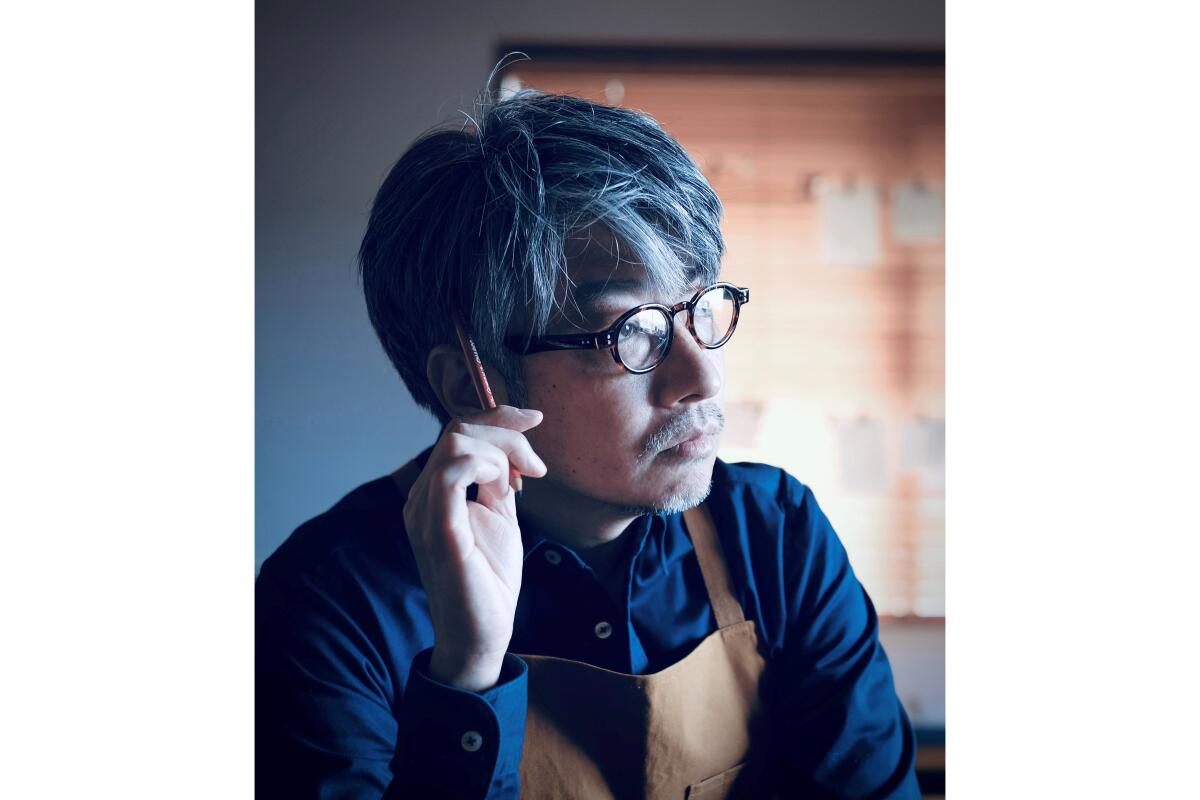
Earlier in the week, musician Keigo Oyamada resigned as the composer for the opening and closing ceremonies. His exit was prompted by an old interview in which he said he bullied disabled classmates when he was in school.
What must be pointed out is how the offensive comments by Kobayashi and Oyamada were made in the 1990s. Someone looked for them. It’s fair to wonder whether the comments would have ever resurfaced if the Games were staged under less contentious circumstances.
Before Kobayashi’s 15 minutes of infamy, the media was fixated on International Olympic Committee president Thomas Bach, who made a poorly received visit to Hiroshima and was welcomed with other officials at a controversial reception that was attended by 40 or so people.
There were also major stories about an alleged sexual assault by an Olympic volunteer from Uzbekistan that occurred at the Olympic Stadium; the ultimately successful manhunt for the Ugandan weightlifter who escaped from his pre-Olympic training camp to start a new life in Japan; and the South Korean team starting a food service for its athletes out of concerns the Olympic village was serving meals that could contain ingredients from Fukushima, which was the site of a nuclear disaster a decade ago.
Just before the Games officially started, organizers looked exhausted and sounded defeated.
When Hashimoto and organizing committee chief operating officer Toshiro Muto were asked whether they were considering resigning, the only justification Hashimoto could offer for continuing was that she didn’t want to cause any further disruptions.
She avoided directly answering a question about whether she regretted the decision to stage the Games, which implied the choice wasn’t hers.
Japan’s ‘rising sun’ flag is a focus of anger at the Tokyo Olympics, with some in the Koreas, China and other Asian nations calling for a ban.
At one point, Hashimoto was asked about women’s soccer game that was played the previous day in the northern part of Japan’s mainland. The match was one of a handful of events at these Olympics in which fans could attend.
The game’s official attendance figure wasn’t announced, leading a reporter to remind Hashimoto of how she had previously spoken of the importance of making the locals feel safe. The reporter asked why the numbers weren’t immediately released and went on to say that he didn’t think she could gain the trust of the public without more transparency.
Spokesman Masa Takaya explained there were problems with the information-gathering process and revealed there were approximately 2,000 people at the match, after which Hashimoto agreed with the journalist’s assertion.
The reporter followed up with another cutting question.
“Regardless of what’s happening with the coronavirus, the attendance figures of sporting events are the kinds of things that are usually announced during games, if not shortly after,” he said. “I think it’s extremely basic. The fact that you can’t even do something like that, what does it say?”
Takaya replied: “We have to accept your point.”
He sounded as if he knew there was no upside in pushing back, as if he accepted that he couldn’t change any minds that day, maybe ever.
More to Read
Go beyond the scoreboard
Get the latest on L.A.'s teams in the daily Sports Report newsletter.
You may occasionally receive promotional content from the Los Angeles Times.

